Andrew Wayne Roark waited 24 years to be cleared of injuring a child.
Over that time, the medical science used to convict him changed. An appeals court threw out his conviction last October, and prosecutors dropped the charges, saying he was innocent. Now defense attorneys across Texas and the nation are hopeful that Roark’s legal victory will soon help others like him – including Robert Roberson, an East Texas man who’s sat on death row for over 20 years.
Roberson has maintained his innocence from the start. Since his 2003 capital murder conviction, he has tried unsuccessfully to convince Anderson County judges that he did not violently shake Nikki Curtis, his 2-year-old daughter, as the state alleges, under a now outdated theory of “shaken baby syndrome.”
By contrast, Roark convinced the Dallas County district attorney, a state district court judge and the state’s highest criminal appeals court that shaken baby science did not prove he shook his girlfriend’s 1-year-old in 1997 in DeSoto, causing brain injury.
That was years after a Dallas County jury convicted Roark, 48, of injury to a child in 2000 and sentenced him to 35 years in prison for “vigorously shaking” the girl.
Crime in The News
The state’s Court of Criminal Appeals earlier this month ordered a lower court to examine whether its Roark findings should apply also to Roberson. If so, Roberson would likely be entitled to a new trial. That order came one week before Roberson was scheduled to be executed by lethal injection in Huntsville.
Keith Findley, professor emeritus of law at the University of Wisconsin-Madison, said the Roark decision “absolutely should apply” to Roberson.
“There’s just no principled way to grant relief in Roark and deny it in Roberson,” said Findley, an expert in shaken baby syndrome cases.
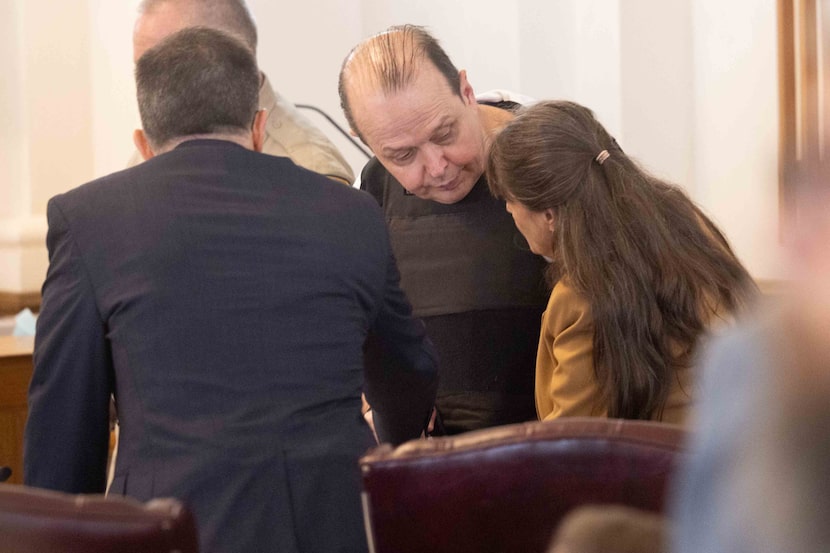
Robert Roberson, the Palestine man facing execution for the death of his 2-year-old daughter, speaks to his attorney Gretchen Sween during a hearing to set his execution date at the Anderson County Courthouse in Palestine, Texas on Wednesday, July 16, 2025.
Juan Figueroa / Staff Photographer
Findley co-founded the Wisconsin Innocence Project and the Center for Integrity in Forensic Sciences and has researched and written extensively about shaken baby cases over two decades. He said the lower court should find the Roark opinion very useful in reviewing Roberson’s case.
“If Roark is read and applied faithfully, it can lead to only one conclusion and that is that this conviction [Roberson] cannot stand,” he said. “Roark was a very powerful holding that fairly definitively shut the door on shaken baby syndrome as a proposition of science in Texas courts.”
Gary Udashen, who was Roark’s attorney for all of his appeals, said the Court of Criminal Appeals could order a new trial for Roberson regardless of the trial court’s recommendation. If so, he thinks the Anderson County district attorney would probably decide to retry Roberson.
Anderson County authorities have steadfastly continued to defend their prosecution and the conviction of Roberson.
A reasonable prosecutor, Udashen said, would not seek a new trial given the outdated science and new evidence in the Roberson case.
Attempts to reach Anderson County District Attorney Allyson Mitchell were unsuccessful. The Texas Attorney General’s Office, which represented the state in recent Roberson matters, also could not be reached.
Udashen said Roark did not wish to speak with a reporter about his case.
Matthew Bowman, Nikki’s half-brother, told The Associated Press he and his family are disappointed by the latest ruling staying Roberson’s execution. Bowman told the news service he believes Roberson should be executed for causing Nikki’s injuries by hitting her.
“In my opinion, he’s the only one that could have done it that night,” he told The Associated Press “So we’re hoping that the execution comes back.”
Related
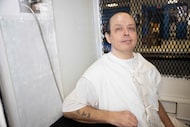 Case similarities
Case similarities
The main difference between the Roark and Roberson cases is that the child who was alone with Roark did not die from her injuries.
Otherwise, the similarities are stark.
Both were circumstantial cases involving a man who was supervising a child, with no eyewitnesses to the injury in question and no incriminating physical evidence found at the scene. Medical testimony from the state’s experts was key to conviction in both cases.
In both trials, prosecutors theorized to the jury that the defendant snapped while caring for a fussy, crying child.
Neither child had skull fractures nor any obvious signs of traumatic injury to their faces, necks or heads, court records say.
Dr. Janet Squires, a Children’s Medical Center child abuse pediatrician, testified in both Roark’s and Roberson’s trials that the brain injuries had to be caused by intentionally inflicted trauma through shaking. She said only something like a serious car crash or fall from a multi-story building could cause the injuries she found in the girls.

Andrew Wayne Roark
Roark family
One significant difference between the two cases is that the Dallas County prosecutors and judge recognized after Roark’s conviction that the science of child head injuries had changed and could no longer be relied upon to prove guilt.
When the Court of Criminal Appeals sent the Roark case back to Dallas County for a new trial in late 2024, the DA dropped the charges and declared him innocent. His exoneration was at the time the 47th in Dallas County since 2001.
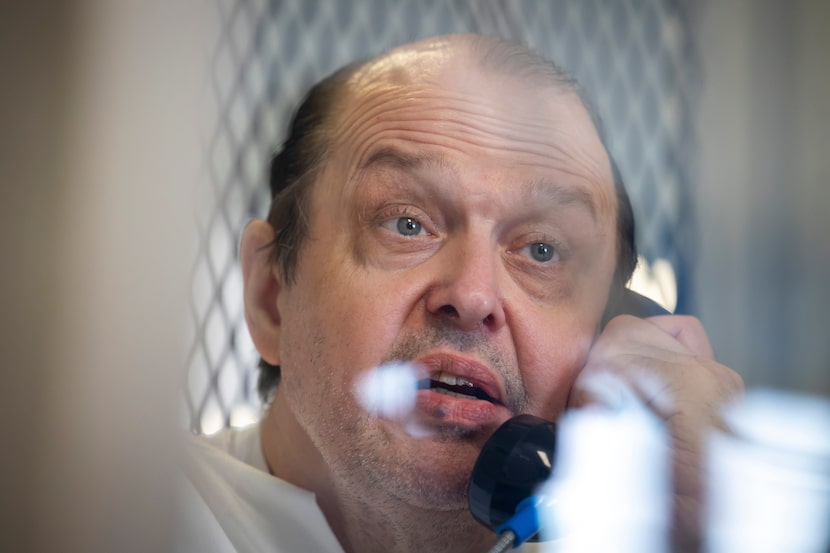
Robert Roberson speaks during an interview with The Associated Press at the Allan B. Polunsky Unit prison in Livingston, Texas, Wednesday, Oct. 1, 2025. (AP Photo/Annie Mulligan)
Annie Mulligan / AP
Roberson’s lawyers say the Anderson County district attorney and judge in his case, by contrast, ignored the new medical evidence and testimony they presented “over 10 court days in 2018 and 2021.” That new evidence, they say, casts significant doubt on Roberson’s guilt.
Udashen said the landmark 57-page appellate ruling in Roark’s case is “the most thoroughly written opinion addressing the new [shaken baby] science from any court in the country.”
And it’s the first time the state’s Court of Criminal Appeals has evaluated the totality of the shaken baby syndrome hypothesis, he said.
“Based upon this remand, the courts are going to have to address the shaken baby syndrome science as it applies to Roberson,” Udashen said. “Nobody’s done it up to this point.”
Findley said an Anderson County judge’s previous denial of relief in the Roberson case after having access to new defense evidence was not a “very good sign about the objectiveness or the thoroughness of the review.”
“The judge’s ruling was logically and factually flawed in ways that are troubling,” he said, noting that the judge did not address the new evidence in her 2022 ruling.
“Roark is an example of what happens when courts do it right and look at the objective facts,” Findley said. “Roberson is not.”
The Anderson County judge, who is now retired, could not be reached at two different phone numbers.
The Court of Criminal Appeal’s decision to again send the Roberson case back to the lower court is telling, he said.
“It seems that the remand is suggesting to the trial court, you need to look at this thoroughly,” Findley said.
In 2013, when the DA and judge in Dallas agreed with Roark’s defense that there was new science and that the conviction should be vacated, Udashen got his client released from prison on bond while the appeal worked its way through the courts.
Udashen said that allowed him time to patiently and methodically track new case opinions and new scientific studies on brain injuries in young children.
“Some of the pressure to get this resolved was a little eased because he wasn’t in prison anymore,” Udashen said. “It was in this constant state of development.”
Related
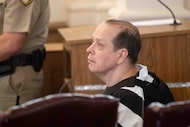
The Court of Criminal Appeals took the time, he said, to wait “until everything was ready before they wrote their opinion.” The judges concluded in 2024 that if “newly evolved scientific evidence” were presented at Roark’s trial, he would not have been convicted.
“It is one of the leading cases in this area now,” Udashen said.
Gretchen Sween, Roberson’s attorney since 2016, said she is hopeful a new trial will be ordered for her client, at which point “the decision whether to re-prosecute Robert would fall to the Anderson County DA.”
A Smith County judge is now presiding over the Roberson case after the Anderson County judge recused herself last year without offering a reason.
Medical expertise
Texas’ “junk science” law that took effect in September 2013 was instrumental in allowing Roark to make his new science claims. And it could still help Roberson – despite previous attempts.
The law allows people to challenge their conviction if they can show that new and relevant scientific evidence contradicts evidence the state relied upon to prove guilt at their trial.
District Judge Carter Thompson in Dallas wrote in his findings as early as 2014 that Roark met the requirements of that law.
“The Court finds that the scientific knowledge concerning shaken baby syndrome has changed considerably since the time of Roark’s trial,” the judge wrote. “The Court finds that the scientific basis of the state’s case is not valid under current scientific knowledge.”
Thompson recommended that the Court of Criminal Appeals throw out Roark’s conviction and send the case back for a new trial. The prosecutor agreed with those findings, court records show.
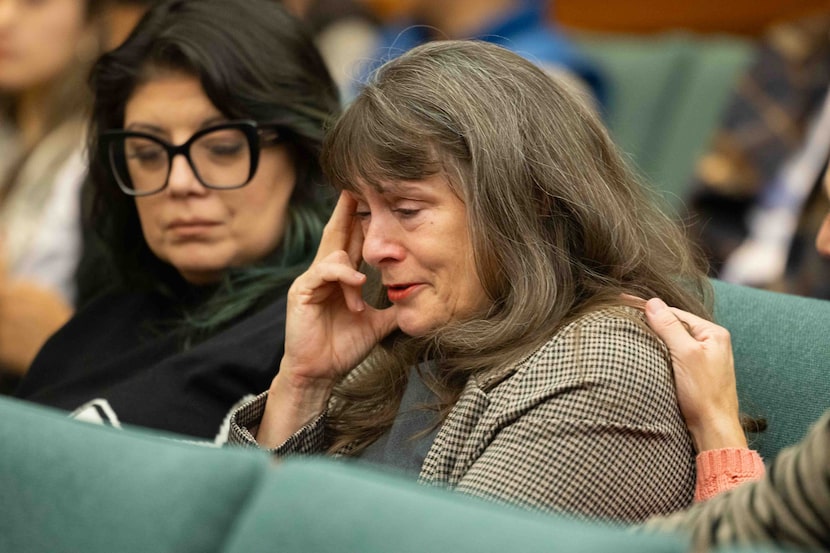
Gretchen Sween, attorney for death row inmate Robert Roberson, cries after listening to Texas Rep. Brian Harrison deliver his opening remarks during a Texas House Committee on Criminal Jurisprudence meeting at the Texas State Capitol in Austin on Dec. 20, 2024. Roberson, 58, was set to testify before the committee after being issued a subpoena. The Texas attorney general’s office derailed the committee’s efforts.
Juan Figueroa / Staff Photographer
The Dallas DA’s Office has a Conviction Integrity Unit that reviews cases when new doubts about evidence and guilt arise.
Anderson County, like most small counties in Texas, does not.
Courts nationwide are increasingly overturning shaken baby syndrome convictions. More than 30 people who served time in prison for such convictions have since been declared innocent, according to the National Registry of Exonerations.
In 2019, Thompson issued additional findings in Roark’s case that referenced an affidavit from Squires in which the pediatrician recanted a portion of her trial testimony in the case.
Squires testified at Roark’s trial in 2000 that it wasn’t likely for the child’s previous head injury to re-bleed after impact from a subsequent fall, court records say. In her affidavit, Squires acknowledged that new scientific research showed it could occur, according to court records.
During his trial, Roark’s defense had attributed the girl’s injuries to accidental falls on separate days. During the first, she hit her head on a coffee table. Weeks later, she hit her head in the bathtub and fell out of her bed while under Roark’s care, the defense said.
The child’s condition when she was rushed to the hospital was the result not of shaking, the defense said, but of a fall that led to “rebleeding” in an area of the head that sustained injury from the previous fall.
Thompson wrote in his 2019 findings that the jury convicted Roark of serious bodily injury “based mainly on Dr. Squires’ testimony.” And he said Squires’ affidavit “directly contradicts her trial testimony.”
“The Court finds that the State’s own expert witness from trial, Dr. Janet Squires, has agreed that there is new medical science that contradicts her testimony from the trial of this case,” Thompson said in his findings.
Udashen said it wasn’t easy to get Squires to sign that affidavit. She refused for years to speak with him, he said. The Dallas DA’s Office also was “unable to interview Dr. Squires as part of their investigation of the new science in this case for some time,” Thompson wrote in his 2019 findings.
Squires signed the affidavits, Udashen said, after the DA’s threat of a subpoena.
Squires left Dallas in 2004 and moved to Pittsburgh, according to court records. She retired a few years ago, Udashen said. Attempts by The Dallas Morning News to reach her by phone and email were unsuccessful. Messages left at two different phone numbers were not returned.
Sween, the lead attorney for Roberson, argued in an August court filing that Squires’ “extensive testimony” about shaken baby syndrome in Roberson’s trial was “virtually identical” to her testimony in the Roark trial.
She said Squires has declined to speak with her about Roberson’s case.
Exonerated
Findley said the Court of Criminal Appeals’ latest order in the Roberson case would suggest it is inclined to grant a new trial.
“But it’s dangerous,” he said, “to read too much into those things.”
It’s also difficult to predict whether the state will retry Roberson if his conviction is thrown out, Findley said, adding that he’s seen shaken baby cases that both did and did not end in retrials.
Courts are generally reluctant to overturn old criminal cases due to the passage of time and the difficulties in retrying them, he said. The evidence always gets worse, he said. Documents are lost and memories fade.
That, however, does not apply in a case like Roberson’s, he said.
“These cases are not premised on eyewitness accounts or people’s memories. They’re premised on scientific findings and expert testimony,” Findley said. “The passage of time actually makes our access to truth better, not worse, because the science evolves and improves.”
Roberson does not have a new execution date.
The next development in his case is likely to come from the Smith County district judge, Austin Reeve Jackson, who must re-examine the case with the 2024 Roark appellate decision in mind.
Jackson will have to come up with a recommendation for the Court of Criminal Appeals, as to whether or not Roberson should be granted a new trial based on the new evidence and on the Roark appellate decision.
The Court of Criminal Appeals court can either accept that recommendation or not, and will ultimately rule on what it thinks the appropriate action, if any, should be in the case.
